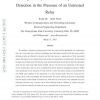Free Online Productivity Tools
i2Speak
i2Symbol
i2OCR
iTex2Img
iWeb2Print
iWeb2Shot
i2Type
iPdf2Split
iPdf2Merge
i2Bopomofo
i2Arabic
i2Style
i2Image
i2PDF
iLatex2Rtf
Sci2ools
CORR
2010
Springer
2010
Springer
Strong Secrecy and Reliable Byzantine Detection in the Presence of an Untrusted Relay
We consider a Gaussian two-hop network where the source and the destination can communicate only via a relay node who is both an eavesdropper and a Byzantine adversary. Both the source and the destination nodes are allowed to transmit, and the relay receives a superposition of their transmitted signals. We propose a new coding scheme that satisfies two requirements simultaneously: the transmitted message must be kept secret from the relay node, and the destination must be able to detect any Byzantine attack that the relay node might launch reliably and fast. The three main components of the scheme are the nested lattice code, the privacy amplification and the algebraic manipulation detection (AMD) code. Specifically, for the Gaussian two-hop network, we show that lattice coding can successfully pair with AMD codes enabling its first application to a noisy channel model. We prove, using this new coding scheme, that the probability that the Byzantine attack goes undetected decreases exp...
| Added | 25 Dec 2010 |
| Updated | 25 Dec 2010 |
| Type | Journal |
| Year | 2010 |
| Where | CORR |
| Authors | Xiang He, Aylin Yener |
Comments (0)

